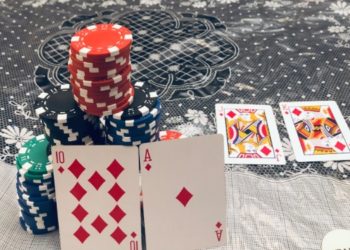Poker is the best known game of skills across the globe. Starting for any player means learning, developing, and sharpening your poker gaming skills to gain any advantage over a casino or dealer. Understanding the game rules means picking out a winning strategy or adapting to any new poker game variation on offer. The only challenge for beginners is ensuring you have fun while collecting wins simultaneously. This isn’t the only advice available to beginners poker players in the US. Here is more.
- Start with simulation sites or free poker games.
Starting with free poker simulations, demo games in online casinos, and poker strategy software is easy for US players. A beginner can use these tools to study the rules of playing poker, strategies to use, and poker gaming odds. Poker simulation sites and software offer real live game statistics you can use to develop a winning streak the next time you try playing for real money.
- Grow your game gradually.
Don’t start with high stake tables, wagers, or games. Every learning opportunity should be gradual. Start small with your bets, game odds, or hands. Starting with two of a pair is easier to understand than going for Royal Flush or a Four of a Kind. Also, starting your wager with a $1 will not result in a regrettable loss compared to wagering $100. Therefore, start with the small stakes and build your bets and gambling reputation before going for high-roller poker games.
- Learn when to be aggressive, step back, or be patient.
Aggressiveness when playing poker does pay. Whenever you take on a match, always push the weaker gambler out. Push the potential payment odds as high as possible before you cash in your hands. However, you do not have to fold if everything in the aggressive doesn’t work out. You can step back by reducing the wager, skipping the cards dealt for the second round, or trying out the bonus round. If playing a losing game, be patient and learn the poker strategies; observe the game before you deal with the cards.
- Keep Practicing
The best way to learn is to keep playing poker and, if possible, paid poker. When playing for free there a whole different mindset when your opponents can keep going ‘all in’ with no consequences, so you can get some experience with low-stakes tables. Find some US-friendly online poker sites, deposit a small amount you’re willing to lose, and this will help you to learn the game without worrying about losing a large amount. At the same time, you get to collect wins, manage your bankroll, track your game skills, and more.
- Manage Your Mood
Poker is a high-stakes and high-paying game. The game isn’t a stress reliever, as players must use their mental and physical energy to play. Thus, a single round can be quite taxing if not prepared. Therefore, only play poker when your mind is free from stress and happy. Otherwise, it would be hard to declutter your mind; otherwise, you would find it quite hard to deal with significant losses after a gem.
David Prior
David Prior is the editor of Today News, responsible for the overall editorial strategy. He is an NCTJ-qualified journalist with over 20 years’ experience, and is also editor of the award-winning hyperlocal news title Altrincham Today. His LinkedIn profile is here.




![7 Best POS Software in the UK [2026 Edition]](https://todaynews.co.uk/wp-content/uploads/2026/02/7-Best-POS-Software-in-the-UK-2026-Edition-360x180.png)








































































